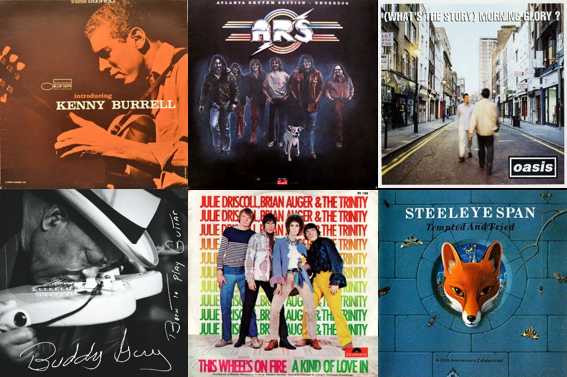It’s Sunday, and once again, I’d like to welcome you to another music time travel excursion. As always, the itinerary takes us to six different decades, featuring six tracks in different flavors. Hope you’ll join me for the ride!
The Ben Webster Quintet/Makin’ Whoopee
Today our trip starts in 1957 with jazz tenor saxophonist Ben Webster. Over a 40-year-plus career, which was cut short by his death from a stroke in 1973 at age 64, Webster played and recorded with the likes of Duke Ellington, Johnny Hodges and Billie Holiday. Starting from 1957, a steady series of albums appeared under his leadership or co-leadership. This brings us to Soulville, an album he recorded in October 1957 together with the Oscar Peterson Trio and drummer Stan Levey. It was released the same year, billed as The Ben Webster Quintet – smooth, unlike Webster’s temper that reportedly was volatile.
Buffalo Tom/Taillights Fade
The next stop takes us to March 1992 and Let Me Come Over, the third studio album by Buffalo Tom – shoutout to Tony from Mumbling About..., who recently covered the alternative rock band and told me he’s been recommending them to people for a long time. I was sold immediately after listening to a few songs. Formed in Boston in 1986 by Bill Janovitz (vocals, guitar, piano), Chris Colbourn (bass, guitar vocals) and Tom Maginnis (drums, percussion), Buffalo Tom have released 10 studio albums to date, most recently Jump Rope on May 31. From their above third album, here’s Taillights Fade – love that melodic, jangly sound!
Muddy Magnolias/Why Don’t You Stay
Muddy Magnolias was a short-lived duo formed in 2014 by Jessy Wilson, an African American singer-songwriter from Brooklyn, New York; and Kallie North, a white pianist from Beaumont, TX. Wilson’s influences include Aretha Franklin, Smokey Robinson, Lauren Hill, Mary J. Blige and The Notorious B.I.G., while North grew up listening to artists like Carpenters, Alison Krauss, James Taylor and Eagles. In October 2016, they released their only album, Broken People, which blended blues, country, folk, rock, R&B and soul. After North left in 2017, Wilson resumed her solo career. Let’s listen to the amazing Why Don’t You Stay.
The Kingsmen/Louie Louie
Time to pay a visit to the ’60s with a classic, as far as I’m concerned: Louie Louie by The Kingsmen. Their version of the song by Richard Berry, who first released it in 1957 as Richard Berry and the Pharaohs, became their second and biggest hit single released in April 1963. It was also included on their first album The Kingsmen In Person, which came out in December of the same year. Louie Louie has also been covered by Rockin’ Robin Roberts and the Wailers (1961), Paul Revere & the Raiders (1963), The Beach Boys (1964), Otis Redding (1964), The Kinks (1964) and many others.
Guns N’ Roses/Sweet Child o’ Mine
Let’s next head to July 1987 and the epic Sweet Child o’ Mine by Guns N’ Roses. The hard rock band from Los Angeles was formed in 1985 by members of two local glam metal bands, Hollywood Rose and L.A. Guns. By the time Guns N’ Roses recorded their debut album Appetite for Destruction, their classic line-up was in place: Axl Rose (lead vocals), Slash (guitar, backing vocals), Izzy Stradlin (guitar, backing vocals), Duff McKagan (bass, backing vocals) and Steven Adler (drums). Sweet Child o’ Mine, credited to the entire band, also appeared separately as the album’s third single in June 1988 and became the group’s only song to top the Billboard Hot 100.
Yes/Siberian Khatru
Once again we’re reaching our sixth and final stop. Today we wrap up our little music excursion in September 1972, which saw the release of Close to the Edge, the fifth studio album by British progressive rock group Yes – one of the few bands of the genre I’ve warmed up to over time. It was the last album to feature the band’s original drummer Bill Bruford, who would join King Crimson once the recording had finished. The other members included co-founders Jon Anderson (lead vocals) and Chris Squire (bass, backing vocals), along with Steve Howe (guitar, backing vocals) and Rick Wakeman (piano, organ, synthesizer, Mellotron) – arguably, the group’s best line-up. Here’s Siberian Khatru, co-written by Anderson, Howe and Wakeman. Yep, it’s long but, hey, it’s prog rock! 🙂
Last but not least, here’s a Spotify playlist of the above goodies. Hope there’s something you like. So long!
Sources: Wikipedia; Acclaimed Music; YouTube; Spotify

